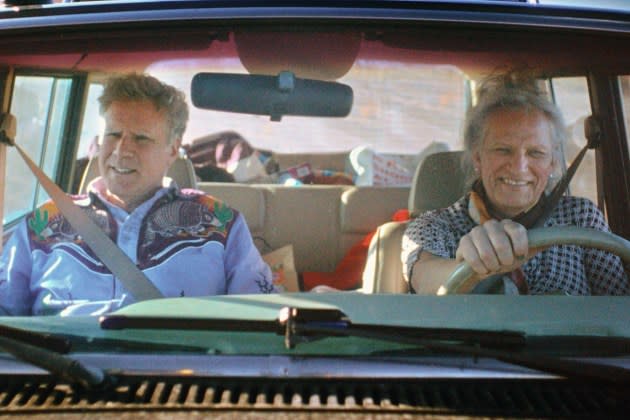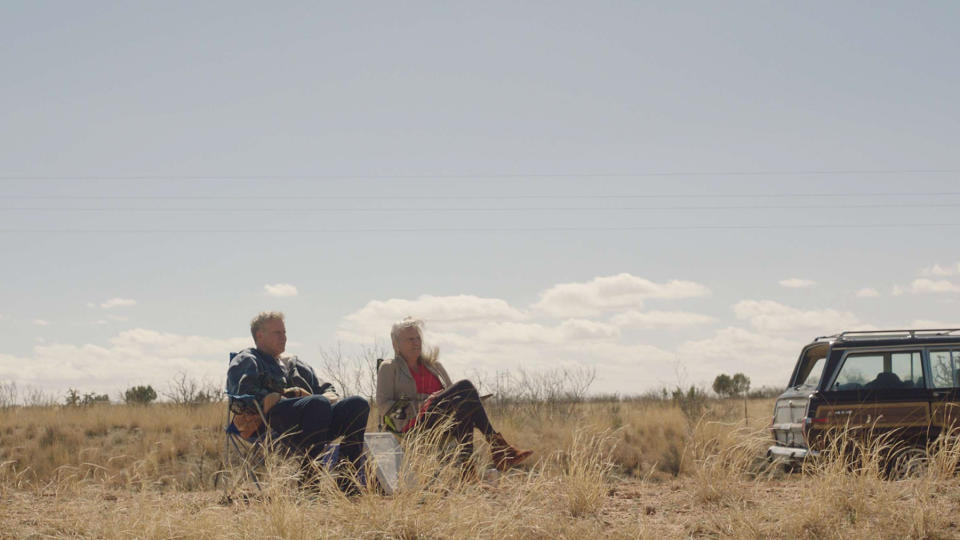‘Will & Harper’ Follows Will Ferrell and His Trans Best Friend Harper Steele Across a Divided America

Long before she transitioned, Harper Steele was a writer at Saturday Night Live. She was hired in 1995, the same week that a performer named Will Ferrell joined the cast. Unlike his fellow Groundlings Chris Kattan and Cheri Oteri, who’d also been recruited from the L.A.-based improv group to join SNL that season, Ferrell had a hard time finding his groove right away. No one quite knew how to use this tall comedian with the deadpan stare and an ability to go from 1 to 1,000 on the rage scale in seconds flat. But Steele recognized something in Ferrell, and the two soon became creative soulmates on the show. They kept collaborating on projects after the actor left SNL in 2001, the weirder and more unusual — a Lifetime TV movie, a comedy made entirely in Spanish — the better. “If you’ve ever scratched your head and said, ‘Why did Will Ferrell make that?'” the star says, “there’s a good chance that [she] was involved.”
The two lost touch a bit during the pandemic. Then Steele sent Ferrell an email: After decades of feeling like she was trapped in the wrong body, she was finally going to live her truth. He sent back a note offering love, support, and a joke or three. Ferrell also proposed an idea to his longtime friend. Steele loved to take road trips across the country. Now that she had transitioned, it would change the way she navigated such endeavors. But what if they took one together, hitting up as many of her favorite dive bars and diners and old haunts as possible, and see what happens?
More from Rolling Stone
Lil Nas X Is Learning to Accept Himself in New 'Long Live Montero' Documentary - Here's How to Watch
The New York Nazis Who Loved Hitler, Hated Jews, and Packed MSG
The duo also had the foresight to bring some cameras along for the ride, and Will & Harper documents their trek across America — just two old pals, one of whom has moved closer to her real self, and the other, who wants to understand how, or if, things have changed for the two of them. The fact that half of this pair is, per Ferrell’s introduction of himself, “one of the greatest actors in the world,” changes the dynamic of their encounters along the way. Fame has a way of bringing both welcome and unwanted attention. So, for that matter, does the ever-changing scale of tolerance toward trans rights in the U.S. at this moment, which runs the gamut from progressive to highly politicized hate. Steele is extremely aware that having her old SNL buddy with her may smooth out potentially volatile situations. She’s also cognizant of the fact that she may not be welcome in certain spots anymore. “I love this country,” Steele says. “I just don’t know if it loves me back.”

Once Ferrell and Steele hit the road, they find pockets of sympathy and courtesy in unlikely places, like a “bikers welcome!” bar and a stock-car race in rural Oklahoma. (“I’m not really afraid of these people,” she admits after the race’s crowd prove to be surprisingly neighborly. “I’m afraid of hating myself.”) An evening in a Texas steakhouse becomes palpably uncomfortable, even with Ferrell dressed up as Sherlock Holmes; a montage of social media posts confirm that the two weren’t exactly welcomed with open arms there. Steele is misgendered several times and politely corrects each offender, yet you can see it wearing on her a bit. A stop at a Pacers game accidentally ends up with the two being lured into a photo op with Indiana Gov. Eric Holcomb, i.e. this anti-trans douchebag. There are also vignettes involving unicycles (Steele rode one as a kid), fireworks, Will Forte in a hot-air balloon, and a night out in Vegas with Steele dolled up to the nines and Ferrell sporting a ridiculous fake mustache. You never forget that these two make their living by making comedy.
But the real meat of the film lies in the conversations these two have driving down freeways and back roads, hitting tourist spots and drinking Steele’s beloved cheap beer while lounging in lawn chairs. You’re essentially eavesdropping on the two discussing things both big and small, with Ferrell sincerely “asking the questions you’re not supposed to ask trans people” (per Harper), Steele admitting to a lot of self-loathing over the years and some unhealthy thoughts, and the two both breaking down in tears at various points. It’s genuinely moving, even if director Josh Greenbaum (Barb and Star Go to Vista Del Mar) can’t resist gilding the emotional lily by adding an overbaked score and a K-Tel compilation’s worth of recognizable needle-drops that distract more than they complement scenes. Just because you can afford to license “The Weight” or “Shelter From the Storm” or “Fade Into You” doesn’t mean you have to do so. Especially when you’ve got something so compelling on its own happening right in front of you.
You’re essentially eavesdropping on the two discussing things both big and small, with Ferrell sincerely “asking the questions you’re not supposed to ask trans people” (per Harper), Steele admitting to a lot of self-loathing over the years and some unhealthy thoughts, and the two both breaking down in tears at various points.
There are some who will think that Will & Harper is something like a vanity project, a sort of overly earnest version of Famous Person Learns About Trans Rights and Has Laughs & Tears Along the Way. Others will view it as a Trans Life 101 primer that not only answers questions they may have, but also takes away the “other” element that leads to so much misunderstanding and pushback. People seem mystified by what they don’t know, and after watching this doc, you can’t say you don’t know a trans person. You’ve just spent two hours in the company of one. And still others may feel the spoonful-of-sugar approach is insufficient when basic human rights are being denied and political forces are actively trying to deny that trans people exist at all.
This doc doesn’t claim to represent an experience as a whole. Whether the discussions you listen in on during those long hours on the road are similar to a hundred other discussions between cis and trans people or not is unknown. What Will & Harper is, at its heart, is a portrait of a friendship and how the fundamentals of a deep and lasting bond doesn’t change even when the people within it do. That alone makes it worth the trip. Yet to hear Steele open up and see her feel accepted by one of her oldest confidants is a joy. The doc is flawed. The chance to ride shotgun in the less-outrageous, more painfully personal moments is priceless.
Best of Rolling Stone
